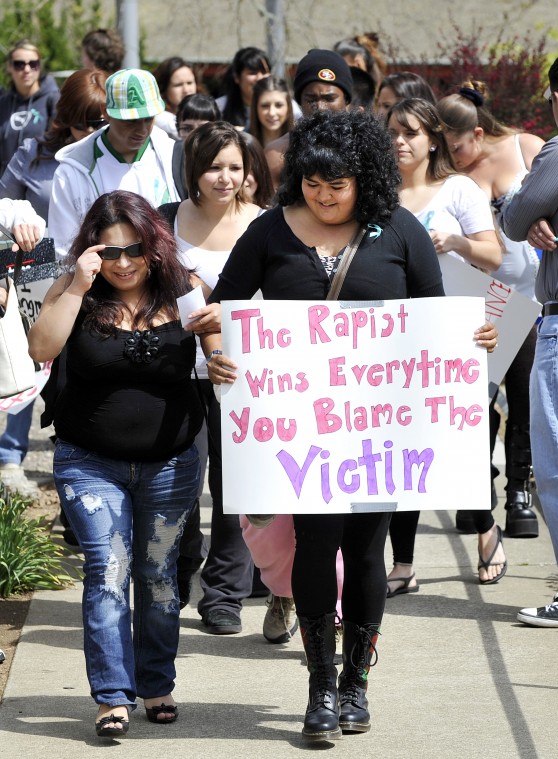
The word “slut” strikes miscellaneous cords.
From an objective standpoint, the label implies a promiscuous woman, according to Webster’s Dictionary.
A broader scope of the term’s connotations can be viewed at Urban Dictionary.com – a vernacular glossary authored by the public that lists approximately 348 entries for “slut.”
Interpretations range from “a girl who comes from today’s broken family,” to “a woman with the morals of a man,” to “someone who provides a very needed service for the community and sleeps with everyone,” to “a derogatory term.”
Openly deconstructing “slut” and its myriad implications is like yanking the tail of a sociological dragon: It makes some people uneasy. It segues to touchy topics. It ignites discussion.
Those are good reasons to stage a “SlutWalk,” according to Rachelle Escamilla, 29, a Gavilan College adjunct English instructor.
“Gavilan needs to be more active. This is a college and change happens here,” said the curly-haired Hollister native, prior to leading a group of 70 chanting students around campus Tuesday.
Judging from the event’s lively and colorful turnout, Escamilla has found like-minded company. In conjunction with the month of April (National Rape Awareness Month), Escamilla spearheaded Gilroy’s first-ever “SlutWalk,” an anti-rape and sexual abuse forum organized locally with the help of a brand-new Gavilan club called SERA (Students Encouraging Rape Awareness).
The march also served as a tangible extension to one of Escamilla’s classes, where students read works by 17th century author and women’s rights advocate Judith Sargent Murray.
“I believe that slut-bashing is something that is very present in our society, but very rarely talked about,” said student Katie Hipol, who is 21 and hails from Morgan Hill. “When it is talked about in public, it’s giggled about, and that trivializes the topic. This brings fire and awareness to it as a real issue.”
When asked if she had any reservations regarding the provocative title of Tuesday’s forum, Escamilla grinned and shook her head.
“These are college students,” said Escamilla, who did not encounter any opposition to the event. “How are you going to get them involved unless you shock them into involvement?”
The concept of a “SlutWalk” is no anomaly, however.
After Toronto police constable Michael Sanguinetti advised a group of York University students in January 2011 to avoid sexual assault by not dressing like “sluts,” an impassioned movement aimed at reassessing victim-blaming spread like wildfire. Following the first SlutWalk held April 3, 2011 in Toronto, organized SlutWalks have since been staged in most major U.S. cities and other parts of the world.
Touting the philosophy that “no one should equate enjoying sex with attracting sexual assault,” SlutWalk participants stand against the idea of “slut shaming,” bashing and/or attacking a woman or a girl for being sexual.
Gavilan student Danielle Caltabiano got involved because several of her close friends have experienced sexual abuse. The 24-year-old Hollister resident dressed for Tuesday’s occasion with the intention of turning heads by donning a revealing corset, black fishnet stockings and combat boots.
“Am I a slut because I dress like this? Am I asking for someone to come take advantage of me because I’m comfortable with my body?” she said, indicating to her form-fitting ensemble. “Just because I’m dressed like this, it’s not an invitation.”
Caltabiano, who opted for a “gothic” style of dress when she was younger, remembers being called a “slut” by her classmates.
“And I was still a virgin,” she said.
Alex Lopez, a 24-year-old student from Morgan Hill who paraded around campus in a white T-shirt and boxer briefs, echoed Caltabiano’s point of view.
Falling behind the boisterous crowd after it marched through the cafeteria – where students studying, eating or listening to their iPods looked on with curiosity at the spectacle – Lopez said women should have the right to dress however they want without being criticized, stigmatized or harassed.
A handful of participants demonstrated this point with signs that read, “showing my legs doesn’t mean I will spread them,” or “the rapist wins every time you blame the victim.”
Towering above his peers while holding a sign that declared, “you gotta work harder than roofies,” (in reference to the date-rape drug), Gavilan student and basketball player Stanley Morgan, 22, of Gilroy, was one of many young men marching in Tuesday’s SlutWalk.
“I believe in not judging a book by its cover,” he said. “You shouldn’t judge people by what they wear.”
Choice of garb – however provocative or attention grabbing – is not a hall pass for unwanted sexual encounters, Lopez added.
Participating in an event that challenges the mindset of rape culture hit home on an intensely personal level for student Kati Koesling of Hollister.
Standing out among her peers in a black and red tutu, the petite 20-year-old lingered after the crowd dissipated to talk about the four years of rape and sexual abuse she recently endured at the hands of a close friend – whom Koesling said threatened to hurt her friends and family members if she said anything.
As someone who struggled to find the courage to finally speak up, “it’s just as much about listening to (a sexual abuse survivor) when they tell you about,” said Koesling, who attended San Benito High School.
After circling campus and re-convening under a large gazebo, staff, students and representatives from Planned Parenthood and South County social services agency Community Solutions fueled dialogue with personal stories and stimulating questions.
Gavilan English instructor Mark Fuzie, who wandered over to the gazebo after observing the SlutWalk, recalled one instance where he accompanied his wife to a baby shower. The women went to one room in the house to open presents, while the husbands gravitated to the kitchen, “where there was beer,” joked Fuzie.
At one point in the conversation, the men began to casually fantasize about installing stripper poles in their workshops, Fuzie said. Uncomfortable with the dialogue, he recalls mustering enough gumption to voice his disapproval.
“They were so embarrassed,” he said. “It was the strongest thing I’ve ever done in my life. We have to challenge those conversations.”
Hollister student Jessica Fox-Elbanhawy, 25, encountered the same derogatory attitude when several of her male peers overheard her talking about the SlutWalk.
“They said, ‘Oh, well I would go to it just to be at a parade of sluts,’” said Fox-Elbanhawy. “Now that is a problem.”
It’s this mindset Escamilla wants to chip away at.
As a survivor of sexual abuse who didn’t have access to free therapy until she attended graduate school at the University of Pittsburgh, Escamilla hopes SERA will give those who need support a “soft place to land.”
“That’s why we decided to have this today,” she said. “We need to start the conversation … rape and sexual assault needs to be talked about on campus.”









